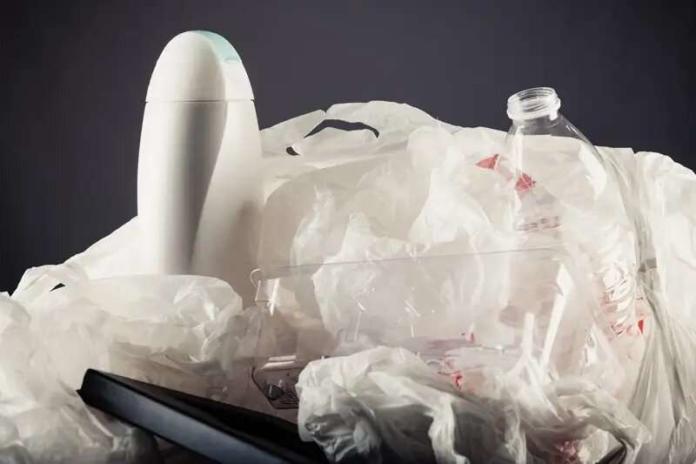IN the United States, less than 9% of plastic waste is recycled. Instead, more than 75% of plastics waste ends up in landfills and up to 16% is burned, a process that releases toxic gases into the atmosphere.
Researchers from the University of Delaware’s Center for Plastics Innovation (CPI) have developed a direct method to convert single-use plastic waste—plastic bags, yogurt containers, plastic bottles and bottle caps, packaging and more—to ready-to-use molecules for jet fuels, diesel and lubricants.
The work, reported in a paper in Science Advances on Wednesday, April 21, focuses on using a novel catalyst and unique process to quickly break down these hardest-to-recycle plastics, known as polyolefins. Polyolefins account for 60 to 70% of all plastics made today.
The UD-developed process requires approximately 50% less energy than other technologies, and it doesn’t involve adding carbon dioxide to the atmosphere, an emissions savings over other commonly used techniques. It can be done in just a couple hours at low temperature, around 250⁰C, slightly higher than the oven temperature you might use to roast vegetables or bake a puff pastry at home.
Importantly, the UD team’s method can treat a variety of plastics, even when they are mixed together, a plus considering the way recyclables are managed.
Creating ready-to-use molecules
The UD research team used a chemical process called hydrocracking to break down the plastic solids into smaller carbon molecules, then added hydrogen molecules on either end to stabilize the material for use.
Catalytic cracking is not new. Refineries have used it to convert heavy crude oil into gasoline for years.
The research team’s method, however, does more than just break the plastic down. It also converts the material into branched molecules that allow them to be more directly translated into an end product.
The catalyst itself is actually a hybrid material, a combination of zeolites and mixed metal oxides.
Zeolites are known to have properties that make them good at creating branched molecules. Zeolites are found in things like water purification or softener systems and home detergents, where they counteract minerals like calcium and magnesium, making hard water softer and improving the laundry process.
Mixed metal oxides, meanwhile, are known for their ability to break down large molecules just the right amount without overdoing it. The antacid in your medicine cabinet, for example, is a metal oxide used to break down, or neutralize, the acid causing your upset stomach.
Alone these two catalysts do poorly. Together, the combination does magic, melting the plastics down and leaving no plastic behind.
Sustainable solutions, circular economy
Reducing plastic waste by chemically converting it to fuels can play a powerful role in driving a circular economy, where materials are recycled into something new at the end of their useful lifespan, instead of being thrown away. The recycled components can be used to make the same thing again or, in the case of fuels, upcycled into higher-value products—creating both economic and environmental gains.
Next steps in the CPI research include exploring what other plastics the team’s method can treat and what products it can make. To begin the team hopes to expand collaborations with colleagues across campus and in the Center for Plastics Innovation to explore other avenues for making valuable products by eliminating waste.
As this circular economy gets going, the world will need to make fewer original plastics because we will be reusing materials made today into the future.
Another goal is to develop methods to improve the recycling process itself.
